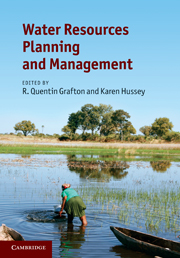Book contents
- Frontmatter
- Contents
- List of contributors
- Foreword
- Preface
- Acknowledgements
- Introduction
- Part I Understanding ‘water’
- 1 Climate change and the global water cycle
- 2 Understanding global hydrology
- 3 Groundwater and surface water connectivity
- 4 Understanding the basics of water quality
- 5 Inland water ecosystems
- 6 Water, biodiversity and ecosystems: reducing our impact
- 7 Global food production in a water-constrained world: exploring ‘green’ and ‘blue’ challenges and solutions
- Part II Water resources planning and management
- Part III Water resources planning and management: case studies
- Contributors
- Index
- References
4 - Understanding the basics of water quality
from Part I - Understanding ‘water’
Published online by Cambridge University Press: 05 August 2011
- Frontmatter
- Contents
- List of contributors
- Foreword
- Preface
- Acknowledgements
- Introduction
- Part I Understanding ‘water’
- 1 Climate change and the global water cycle
- 2 Understanding global hydrology
- 3 Groundwater and surface water connectivity
- 4 Understanding the basics of water quality
- 5 Inland water ecosystems
- 6 Water, biodiversity and ecosystems: reducing our impact
- 7 Global food production in a water-constrained world: exploring ‘green’ and ‘blue’ challenges and solutions
- Part II Water resources planning and management
- Part III Water resources planning and management: case studies
- Contributors
- Index
- References
Summary
Introduction
In order to manage water resources it is necessary to take into account not just the amount of water that is used but also its quality. What is usually meant by the term ‘water quality’ is the magnitudes of the physical attributes (like temperature and conductivity) and the concentrations of chemical constituents (like nitrogen, calcium, or aluminium) of a sample of water, although the term ‘water quality’ in fact implies judgement about the suitability of water for a particular use. Sea water is of ‘good’ quality for a marine fish, for instance, but of very poor quality for an insect living in a mountain stream, or for a human being consuming the water. To keep things simple, we will use the term ‘water quality’ to mean ‘what the water is like and what is in it’.
In this chapter we show why natural waters differ physically and chemically from each other; then we explain the importance of some of the major physical attributes and chemical constituents of water, and why some can be considered as pollutants. When describing the contents and effects of a variety of effluents on aquatic ecosystems, we make some comments on management of water impaired by various human activities.
Information
- Type
- Chapter
- Information
- Water Resources Planning and Management , pp. 68 - 89Publisher: Cambridge University PressPrint publication year: 2011
References
Accessibility standard: Unknown
Why this information is here
This section outlines the accessibility features of this content - including support for screen readers, full keyboard navigation and high-contrast display options. This may not be relevant for you.Accessibility Information
- 2
- Cited by
